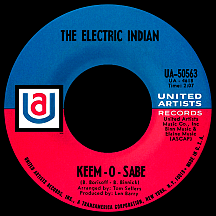THE ELECTRIC INDIAN
Keem-O-Sabe
The Lone Ranger, a mysterious masked rider and protector of the innocent during America's wild west years of the 19th century, is one of pop fiction's most famous characters. Originally created for radio in 1933 by Fran Striker (who also wrote most of the scripts) and George W. Trindle, the show debuted in Detroit and developed a large following very quickly, leading to nationwide exposure on the Mutual radio network. Two 15-chapter movie serials, The Lone Ranger and The Lone Ranger Rides Again, were produced by Republic Pictures in 1938 and 1939 (the first is an oddity in that his identity is kept a mystery, so there is no star in the title role, though actor Lee Powell is revealed to be the Lone Ranger at the end; in the sequel, he's played by Robert Livingston). But it's the television series that has left an indelible impression on most everyone. Premiering in the fall of 1949, this show became the first big hit for the fledgling ABC network. Starring Clayton Moore, a veteran of many B pictures and movie serials, as the title hero and Jay Silverheels, a stuntman and bit player of Mohawk descent with a few dozen small (mostly uncredited) roles on his resumé, as his Indian friend and bad-guy battler Tonto, the series produced new episodes for five years and continued in reruns for decades.
One word viewers remember from those shows is "ke-mo-sah-bee" (or "kemo-sabe" or, as it was later spelled, "keem-o-sabe"). No real need to explain its meaning, as both the Lone Ranger and Tonto regularly threw the term around as a reference to their faithful friendship (though Boy Scouts have an alternate definition, "scout runner," which could also, perhaps, apply to the ever-watchful Tonto). It made sense, then, that this word would one day be used as the title of a musical piece designed to conjure images of redskin warriors.
Len Barry, former lead singer of Philadelphia group The Dovells ("Bristol Stomp" in 1961, "You Can't Sit Down" in '63) and a successful solo singer ("1-2-3" in '65), had an interest in Native American history, likely inspired by the western films of the Saturday matinees of his childhood and the Lone Ranger TV series, which hit the ultra-small screen when he was seven years old. By 1969, his singing career at an impasse, he produced "Keem-O-Sabe," titled after Tonto and his Ranger pal's favorite word, an instrumental built around an old western movie riff (usually heard when Indians were approaching) with a little of Gioachino Rossini's 140-year-old "William Tell Overture" (the classic Lone Ranger TV theme) thrown in. Songwriter credit went to Barry's mother, Bernice Borisoff, and Swan Records owner Bernie Binnick. The track featured studio musicians including Bobby Eli (real name Eli Tatarsky) on guitar and Philadelphia-born jazz musician Vincent Montana on vibraphone; they and others involved worked as session players for Philly producer Kenny Gamble and had landed a minor instrumental hit, "United," on the Gamble label in 1968 as The Music Makers.
"Keem-O-Sabe," credited to The Electric Indian and issued on an oddball United Artists subsidiary label, Marmaduke, Inc. (then switched to UA for wide release), became a surprise hit, spending two months in the top 40 (peaking top 20) from August to October 1969. Len even did a vocal version for the Scepter label with lyrics suggesting the title translated as love between the sexes: '...every brave wanted a Keem-O-Sabe to love him 'til the end,' adding he would also like 'a woman to share his teepee!' Disc jockeys opted not to share these age-old traditions, staying with the first version. An instrumentalized "Land of 1000 Dances" (the crowd-pleasing Chris Kenner-Fats Domino tune) was the follow-up Electric Indian single and reached the national charts in December.
For Len Barry, this was the last popular recording he was associated with, though he continued performing as a live act for many years. Eli, Montana and other ex-Electric Indians were regulars on sessions at Sigma Sound Studios in Philadelphia for many years, later coming together as MFSB (which stands for "Mother Father Sister Brother"), a large orchestra featuring 30 or more members at any given time. Signed to Kenny Gamble and Leon Huff's Philadelphia International label, they had several hits in the 1970s, spectacularly bursting onto the scene with the mostly-instrumental "T.S.O.P." (which means - what else? - "The Sound of Philadelphia!") featuring vocals by The Three Degrees; it was used as the theme for the syndicated Soul Train music-and-dance show hosted by Don Cornelius and hit the top of the charts in 1974.


